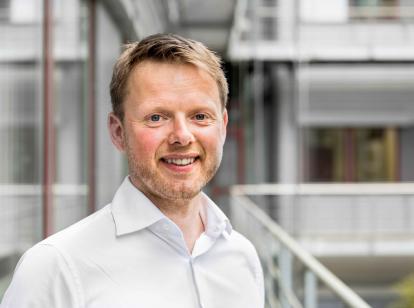Arnold Boersma receives ERC Consolidator Grant for artificial cell research
The Dutch chemist Dr. Arnold J. Boersma (DWI - Leibniz Institute for Interactive Materials and RWTH Aachen University) receives one of the European Research Council's (ERC) highest endowed research grants: an ERC Consolidator Grant. With a budget of two million euros for five years, the ERC is supporting the expansion of his research at the DWI in Aachen. The work of A. Boersma is in the field of biochemistry and synthetic biology. In particular, he will use the EU funds to create artificial cells that allow screening new drugs for diseases that so far remained untreatable.
Shoving for biochemical equilibrium
Cells densely pack proteins and other molecules in their interior, so that the situation is comparable to that of a subway ride in a big city after work. This so-called "crowding" sounds like a lot of stress- but it is essential for the biochemical processes in the cell - and thus, for its health: in this way, proteins and molecules get in contact and can interact. For example, hydrophobic and electrostatic interactions or hydrogen bonds induce various chemical reactions that are essential for the cell to survive. However, interactions caused by crowding can also be harmful and cause diseases such as Alzheimer's or Huntington's disease. Both are well-known progressive neurological diseases that cannot be cured yet.
Crucial for the solving of the secret: artificial cells
"Although crowding is significant, it remains a question of how the cells control biochemical equilibria. With our project PArtCell (Physiologically Crowded Artificial Cells for Relevant Drug Screens), we aim to solve this. Moreover, we aim to develop physiologically relevant platforms that allow the screening of new drugs for the treatment of diseases such as Alzheimer's disease. We are developing approaches in both natural and artificial cell systems that we will compare to each other," explains A. Boersma. In comparison to natural cells, analyses of their artificial counterparts have several advantages – for example, the fact that a large number of unknown parameters influence living cells. In artificial cells, on the other hand, the initial conditions are better defined and thus controlled.
A. Boersma uses state-of-the-art microfluidics to develop artificial cells. This technology can be used, for example, to produce tiny droplets or particles of specific size and shape. DWI has extensive expertise in the field of microfluidics: "We use the excellent facilities in the DWI on microfluidics, and produce artificial cells with a physiologically relevant interior in a rapid and controllable fashion. This makes the DWI the ideal place to realize these research goals," says A. Boersma.
ERC Consolidator Grant: funding for breakthrough approaches and scientific excellence
The ERC Consolidator Grant is one of the most highly valued funding programs of the European Union and enables outstanding scientists to expand their research area further. To receive funding, applicants must prove the pioneering approach of their project and its feasibility.
Arnold J. Boersma, born in 1979 in the Netherlands, studied chemistry at the University of Groningen, where he also wrote his doctoral thesis. Afterward, A. Boersma obtained several grants from the Dutch National Science Organisation (NWO Rubicon, NWO Veni, and NWO Vidi) and worked as a postdoctoral fellow at Oxford University in England from 2009 to 2012 and at the University of Groningen between 2012 and 2018. In 2018, the DWI - Leibniz Institute for Interactive Materials in Aachen appointed him as a group leader. Furthermore, A. Boersma works at the Chair of Macromolecular Materials and Systems at RWTH Aachen University.
In addition to the DWI, two other institutes of the Leibniz Association obtained funding for an ERC Consolidator Grant in 2020: The Leibniz Institute for Natural Product Research and Infection Biology in Jena (Hans Knöll Institute) and the Leibniz Institute for Solid State and Materials Research in Dresden.

